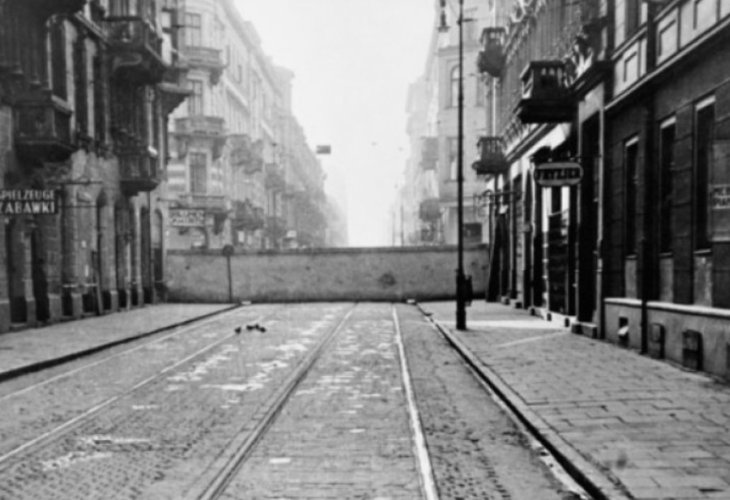Personal Stories
When You Can’t Bear It Anymore, That’s When Hashem Steps In
In the darkest moment of exile, when hope was gone, one Jew discovered how near Hashem’s salvation really is.

Rabbi Yisrael Yitzchak Pomerantz, of blessed memory, was a man of extraordinary dedication. Even as a young boy in Poland, he set for himself a magnificent goal: to learn Torah 18 hours a day. But then World War II came and tore through his world, scattering his dreams and plans. After the war, he moved to Israel and poured his heart back into Torah study. Each morning at 3:00 AM, he would walk to the “Shaar Hashamayim” Yeshiva in Jerusalem, a center of Kabbalah learning, where he immersed himself in the Torah that was his greatest joy.
At the same time, he quietly began writing down his life story. But he was afraid that if people knew who he was, they would interrupt his learning to ask him questions or visit. So, he published his memoirs under a false name: "Itzik Hader." This allowed him to share the miracles he lived through, while still protecting his precious time for Torah.
In one of his memories, which was later shared by Rabbi Rafael Berelson in Yated Ne'eman, Rabbi Pomerantz recounts an unforgettable moment during his years in the harsh labor camps of Siberia.
“One day,” he writes, “I was standing in the long line for bread when I felt a soft tap on my back. I turned around and saw a fellow Jew—his beard unkempt, his hat torn, but his smile wide and full of light. ‘Naftali Dovinsky, from Kiev,’ he said. ‘I’m a Lubavitcher chassid.’ I answered, ‘Yisrael Yitzchak Pomerantz, from Dovshodla. I’m a chassid of Ger.’
We each took our small portion of bread and found a quiet corner to sit. There we shared not only food, but words of Torah, Chassidut (teachings of Jewish spirituality), and deep love for Hashem. Naftali told me he was sent to Siberia for ten years of hard labor. His crime? Rebuking his nephew for no longer keeping Shabbat or putting on tefillin (phylacteries). He worked as a tailor in the camp, a light job. ‘Listen,’ he said, ‘whenever I stand in line, I’ll take your portion too. We’ll always eat together. I’m in barrack 185. Don’t forget.’”
Then came the year 5702 (1942). On the first day of Sukkot, I didn’t go to work. But the following days, even on Simchat Torah—a day usually filled with dancing and celebration—I was forced to work. I was assigned to chop wood, and as the axes echoed through the forest, I whispered to myself, “How I love Your Torah.” In my mind, I imagined the trees dancing to that song, while my own hands, aching and empty, longed for a holy book to hold instead of an axe.
That night, when the holiday ended, I went to barrack 185. When I saw Naftali’s kind face, I broke down.
“Look at me, R’ Naftali,” I sobbed. “Is this Simchat Torah? I worked from dawn to nightfall. I didn’t daven (pray), didn’t rejoice, didn’t learn, didn’t even make Kiddush. I wept like a child. My shoulders shook. I felt like I couldn’t take it anymore.”
R’ Naftali looked at me and gently asked, “Do you know when the time of redemption comes?” I didn’t answer. He said, “When exile becomes unbearable—when it’s so dark you feel you can’t go on—then Hashem brings redemption and salvation.”
I cried again. “I have no strength left. Until now I could hold on, but now I am finished. I can’t suffer anymore.”
He whispered, “It’s written in the Torah: ‘And I will take you out from under the burdens of Egypt…’ When the burden becomes too heavy—that’s when Hashem steps in to redeem.”
We parted and I went back to my cold barrack. The next morning, before the sun rose, the camp bell rang and the prisoners rushed out. Then I heard someone shout, “Are there any prisoners here with names beginning with the letters P.O?” The camp clerk was calling us. “You are ordered to the office for immediate release,” he said.
My name, Pomerantz, was on the list.
I didn’t believe it. I ran to barrack 185, to Naftali. “R’ Naftali!” I cried, tears streaming down my cheeks. “You were right. Your words came true. Hashem’s salvation—it came in a blink.”
He smiled with pure joy. “You are going home,” he said.
That release came only hours after that dark, painful night—the night I thought I couldn’t go on. But as R’ Naftali said, that’s exactly when the light breaks through.
And so I write this,” Rabbi Pomerantz concluded, “to tell you that even in the deepest exile, when the burden seems too much to carry, Hashem is near. That is when redemption begins.”

